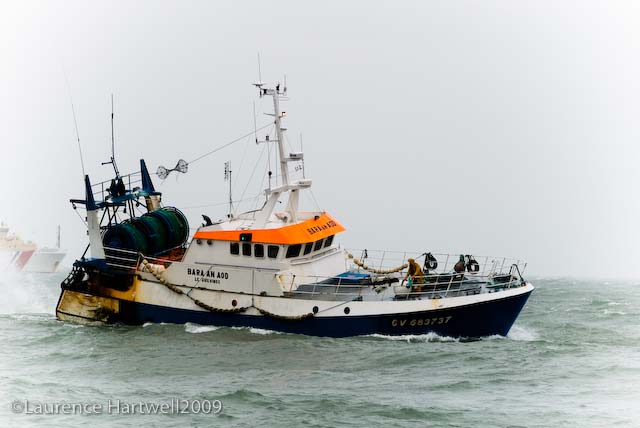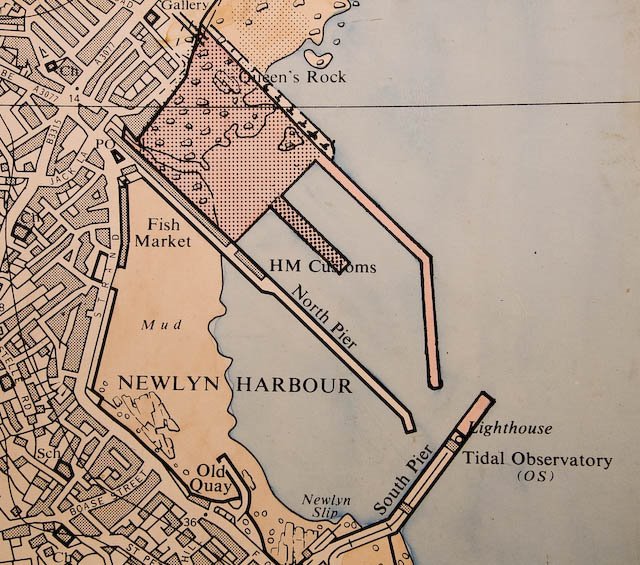Brexit update from the House of Commons library blog, Second Reading:
 |
| Many Breton boats enjoy historic access rights in the South West. |
Excluding EU fishers from UK waters by leaving the Common Fisheries Policy has been a central argument of many Brexit-supporting fishermen. The Government has stated that it is “committed to withdrawing from the CFP and putting in place a new fisheries regime.”
Currently, EU Member States have equal access to all EU seas between 12 and 200 nm, while most Member States control their own inshore territorial waters (0-12 nm).
There are concerns that even if the UK leaves the CFP after Brexit, provisions in the previously redundant 1964 London Convention on fisheries could allow foreign fishing vessels continued access to UK waters between 6 and 12 nm.
The UK would have to give two years’ notice to withdraw from the London Convention, so certain groups are calling on the Government to trigger the exit process at the same time as starting the Article 50 negotiations.
So, what is the London Convention, how does it affect coastal fishing access rights and will the Government trigger the exit process?
What are historic coastal access rights?
Under the CFP, the seas around EU Member States are separated out into the inshore ‘coastal’ waters (0-12 nm) and the EU’s exclusive fishing zone (12-200 nm). Where neighbouring coastal states are closer together than 200 nm, a median line is defined equidistant from the two countries’ coastlines to separate their respective exclusive fishing zones (see map below of the UK’s exclusive fishing zone). The CFP gives equal access to all Member States in the EU’s exclusive fishing zone. Coastal waters are almost exclusively reserved for Member States.
 |
Map of the UK’s exclusive fishing zone
Source: House of Lords (2016)
|
There are certain exceptions which allow foreign vessels access to other countries’ coastal waters between 6 and 12 nm, where they had historically done so before the CFP came into force—so-called ‘Grandfather Rights’.
There are 31 different access rights in UK coastal waters for other Member States. The UK in turn has access to inshore waters of Germany, France, the Netherlands and Ireland.
What is the London Convention, and does it still apply?
The 1964 London Convention was signed by 13 European countries in order to establish and define a fisheries regime for their coastal waters. The Convention also established rights for certain vessels to fish in the 6-12 nm region of the coastal states of the 13 countries, if they had “habitually fished” in that same region between 1 January 1953 and 31 December 1962.
The countries that signed were: Austria, Belgium, Denmark, France, Germany, Ireland, Italy, Luxembourg, the Netherlands, Portugal, Spain, Sweden and the UK.
There is some debate as to whether the London Convention provisions still apply, or whether they have been superseded by the CFP. In evidence to the Lords EU Energy and Environment Sub-Committee, Robin Churchill – Professor Emeritus of International Law at the University of Dundee – said he thought that the CFP superseded the London Convention, meaning that historic fishing rights derive from EU law, and not from the Convention. Prof Churchill was therefore “sceptical” as to whether the London Convention rights could be revived after 40 years. However, DEFRA Minister Lord Gardiner appeared to confirm that the London Convention provisions continue to apply today, in answer to a PQ on 9 March 2017.
Brexit: Taking back control of UK waters?
The Government has stated that it is “committed to withdrawing from the CFP and putting in place a new fisheries regime.” Outside the CFP, the UK will take back control of the seas out to 200 nm (the exclusive economic zone). Departing the CFP would also likely extinguish the historic rights that other Member States had gained under the CFP to fish in the UKs coastal waters. And in turn, the UK’s historic access rights to other Member States inshore waters would also be ceded.
The London Convention requires Member States to provide two years’ notice if they wish to withdraw (Article 15). Therefore, if this notification is not given at the same time as, or before, the Article 50 notification to leave the EU, and the convention is still thought to apply, there could be continued fishing access rights for certain vessels in the UK’s coastal waters between 6 and 12 nm after Brexit. Fishing for leave (a pro-Brexit fishing campaign group) see withdrawal from the London Convention (and the potential anomaly in fishing access rights in coastal waters post-Brexit) as an acid test of the UK Government’s commitment to taking back control of UK seas and fisheries resources.
Access for foreign vessels to continue fishing in UK waters will likely be one of the more difficult topics for discussion during Brexit talks. The European Fisheries Alliance—a grouping of fishing associations from coastal European countries—has recently called for continued access to UK waters post-Brexit.
What has the Government said?
When questioned about the London Convention in a recent Select Committee evidence session, DEFRA Minister George Eustice said (Q.33) that the Government was “looking very closely at this because it is quite a dated agreement in which we have no benefit.” The Minister also noted the possibility of leaving the Convention, but gave no commitment, and said that it was unlikely that the UK would have an exclusion zone where no‑one can come into our waters, because this would need to be part of the wider negotiations on access and quotas. Press reports on 24 March suggested that the Prime Minister would pull the UK out of the convention and end access for European vessels to British fishing waters if talks with the EU over Brexit break down.
For further information on the potential implications of Brexit for fisheries, please see Brexit: What next for UK fisheries?
To access Second Reading go here:
To access Second Reading go here:





